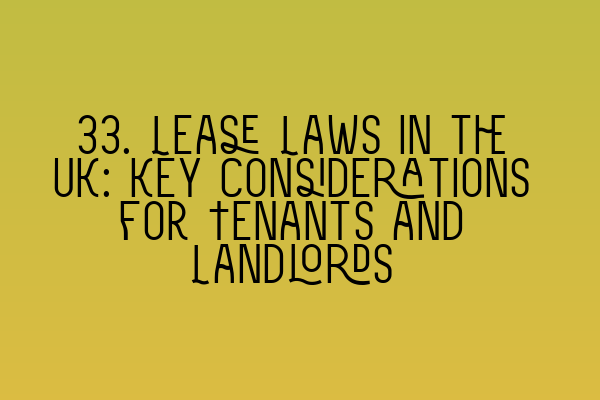33. Lease Laws in the UK: Key Considerations for Tenants and Landlords
Lease laws in the UK play a crucial role in regulating the relationship between tenants and landlords. Whether you are a tenant looking to rent a property or a landlord preparing to lease out your property, understanding these key considerations is essential to protect your rights and navigate the legal landscape successfully.
1. Lease Agreement
The lease agreement is the foundation of the landlord-tenant relationship. It is a legally binding contract that outlines the rights and responsibilities of both parties. The agreement should include important details such as the duration of the lease, rent amount, payment terms, repairs and maintenance obligations, and any restrictions or rules specific to the property.
To ensure a comprehensive lease agreement that covers all necessary aspects, it is advisable to seek legal advice from a qualified property solicitor. They can help you draft or review the lease agreement, ensuring it complies with relevant lease laws and protects your interests.
2. Rent and Deposit
The issue of rent and deposit is a significant consideration for both tenants and landlords. The rent amount should be clearly stated in the lease agreement, along with the payment frequency and method. It is important for tenants to understand their obligations regarding timely rent payments, while landlords should be aware of their rights in case of non-payment.
Additionally, landlords often require tenants to provide a security deposit, which acts as a financial safeguard against potential damages or non-payment. Lease laws in the UK regulate the handling of deposits, including the requirement to protect them in a government-approved scheme. Tenants should ensure their deposit is protected and understand the conditions under which deductions can be made.
3. Repairs and Maintenance
Both tenants and landlords have responsibilities when it comes to repairs and maintenance of the leased property. The lease agreement should clearly outline who is responsible for specific repairs and maintenance tasks. Landlords are generally responsible for structural repairs and ensuring the property is fit for habitation, while tenants are responsible for minor repairs and general upkeep.
It is advisable for tenants to report any repair issues promptly to the landlord or letting agent in writing, keeping a record of all communication. Landlords should address repairs in a timely manner and ensure they comply with their legal obligations. In some cases, tenants may have the right to withhold rent or seek compensation if repairs are not carried out satisfactorily.
4. Termination and Renewal
Understanding the termination and renewal process is essential for both tenants and landlords. Lease laws in the UK outline the various notice periods required for termination of a lease, depending on the type of tenancy. It is important to adhere to these notice periods to avoid potential legal disputes.
At the end of the lease term, both parties may have the option to renew the lease. The terms for renewal should be clearly outlined in the original lease agreement. If either party wishes to make changes to the lease terms, it is important to discuss and negotiate these changes in advance.
5. Legal Advice and Dispute Resolution
Seeking legal advice from a property solicitor is crucial when dealing with lease laws in the UK. A solicitor can provide expert guidance on drafting or reviewing lease agreements, ensuring compliance with relevant laws, and protecting your rights and interests.
In the event of a dispute between tenants and landlords, alternative dispute resolution methods, such as negotiation or mediation, can help resolve issues more amicably and cost-effectively than going to court. However, if resolution cannot be achieved through these methods, legal action may be necessary. Your property solicitor can guide you through the dispute resolution process and represent your interests in court if needed.
Conclusion
Lease laws in the UK are designed to protect the rights and interests of both tenants and landlords. Understanding key considerations such as the lease agreement, rent and deposit, repairs and maintenance, termination and renewal, as well as seeking legal advice when needed, can ensure a smooth and mutually beneficial landlord-tenant relationship.
For more information on the SQE exam, visit our related articles:
- SQE 1 Practice Exam Questions
- SQE 1 Practice Mocks FLK1 FLK2
- SQE 2 Preparation Courses
- SQE 1 Preparation Courses
- SRA SQE Exam Dates
